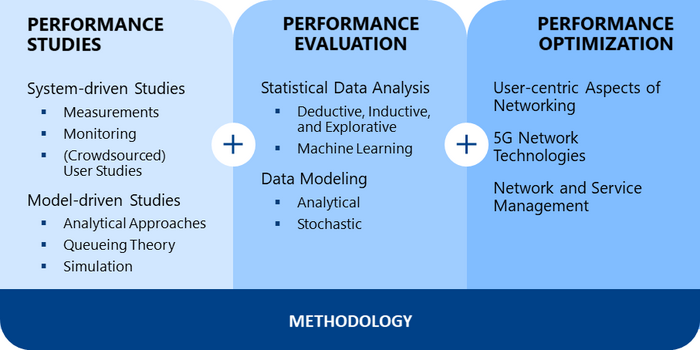Methodology
The research methodology at the chair is centered around the performance of communication systems and networks. Different methods are used to study, evaluate, and optimize the performance, which will be described in further detail below. Please note that all described methodologies have to be regarded as building blocks, which are selected and customized, such that the applied research methodology is specifically tailored for each individual project.

The methodology for performance studies comprises system-driven studies, i.e., studies, which directly use the investigated system:
Measurements Measurement probes are installed and configured to actively measure the performance of a network for different services. Moreover, dedicated testbeds can be set up to investigate performance aspects in (prototype) systems.
Monitoring Monitoring probes are deployed in existing networks to passively monitor the performance of network and services.
(Crowdsourced) User Studies To obtain subjective ratings about the performance of a network or system, user studies are conducted in which participants rate the perceived quality or their satisfaction with a service. In order to reach a more diverse set of participants, user studies can also be crowdsourced as web tests via the Internet.
Moreover, the chair also uses model-driven studies, in which the investigated system is first described by a model. Then, performance studies are conducted with the help of the model.
Analytical Approaches Some systems follow fundamental relationships, which can be described by analytical models. These models can then be investigated to derive performance characteristics of the underlying system.
Queueing Theory Telecommunication research has always used queueing theory to describe basic processes in a network. It allows to obtain scalable and accurate performance results only from mathematical reasoning.
Simulation To investigate the performance of the system, it can also be analyzed with the help of discrete event simulations. Here, the level of detail of the simulation can be easily varied to not only cover whole systems but also detailed aspects of processes in a system.
The chair evaluates performance data (e.g., obtained from performance studies) to get a deep understanding of the performance of the system. For example, the data can be used to derive fundamental relationships for the system performance, identify the root cause of problems, or find configurations, which lead to subobtimal performance.
Statistical Data Analysis The chair relies on statistical methods for deductive, inductive or explorative data analysis. Moreover, machine learning methods are applied.
Data Modelling Models can be helpful to describe the performance data of systems and allow for an easier evaluation of the performance. The chair applies analytical as well as stochastical data modelling.
The chair always strives to improve and optimize the performance of the researched systems. A detailed description of the relevant research topics can be found at the links below.
Research Topics: General overview
- User-centric Aspects of Networking More information
- 5G Network Technologies More information
- Network and Service Management More information


